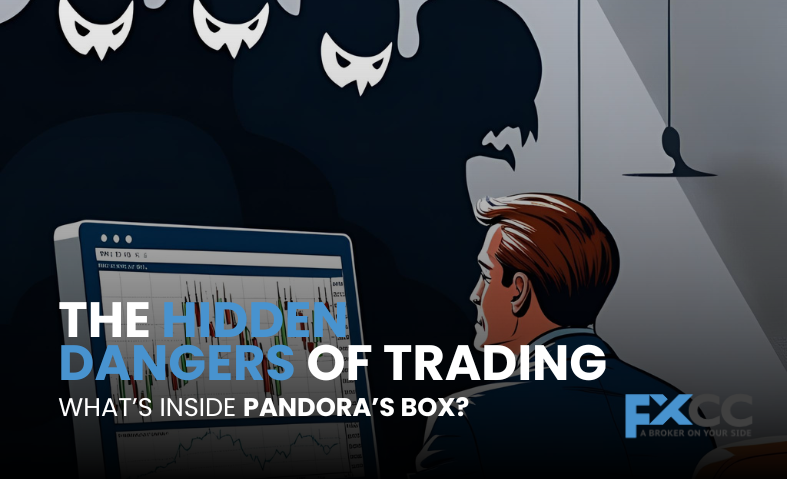Trading might look exciting at first. You see fast-moving charts, people making money from their phones, and the dream of being rich and free. Many get drawn in by the idea of quick cash and working for themselves. Stock markets, Forex, and crypto seem full of chances to win big. Social media makes it look even better. It shows traders living fancy lives, sharing success stories, and flashing profits. But that’s only one side of the story. What you don’t often see is the stress, the losses, and the pressure that comes with it. Behind those green charts and glowing screens is a tough world full of risk and emotion. For some, trading offers real opportunity. But for many, it opens the door to trouble — like opening Pandora’s box, it can let out more problems than you expect. Trading sounds exciting. The fast-paced charts, the chance to make money from your phone, and the dream of financial freedom lure many people into the world of stocks, Forex, and crypto. Social media adds to the appeal with success stories and flashy lifestyles that seem to come from trading profits. But what most people don’t see is the darker side. Behind the shiny screen and green candlesticks lies a world filled with risks, emotional stress, and harsh realities. Trading may open a door to opportunity, but for many, it opens Pandora’s box instead.

The Illusion of Easy Money
One of the biggest traps in trading is the illusion that it’s easy money. Beginners often enter the market thinking they can turn a small amount of capital into a fortune overnight. Influencers and marketers feed this dream by showing luxury cars, exotic vacations, and screenshots of huge profits. What you rarely see are the long stretches of losses, empty trading accounts, and nights spent staring at the ceiling. The truth is that most new traders lose money. They don’t lose because they’re not smart, but because the market is not as simple as it looks. It requires skill, discipline, and experience, and none of that comes overnight.
Emotional Toll and Mental Stress
The psychological pressure of trading is often underestimated. Watching your money go up and down within seconds can be thrilling, but it can also be mentally exhausting. Fear and greed are constant companions. When a trade goes in your favor, you feel like a genius. But when it turns against you, panic sets in. This emotional roller-coaster can lead to poor decision-making and emotional trading, where logic takes a back seat. Over time, this stress can affect not just your mental health but your relationships and overall quality of life. Some traders even develop anxiety or depression from constant exposure to market volatility.
Addiction and Obsession
Trading can become addictive. It offers the same dopamine rush as gambling. That quick hit of excitement when a trade moves in your direction can hook you. Soon, you’re checking charts all day, even at work or during family time. You stop thinking rationally and start chasing losses, trying to win back what you lost in the previous trade. This obsession can take over your life. It’s no longer about building wealth, but about feeding the emotional high of winning. And just like any addiction, the crash when things go wrong can be devastating.
The Trap of Overconfidence
After a few wins, many traders fall into the trap of overconfidence. They believe they’ve figured it out and start taking bigger risks. They may ignore their strategy or increase their position size beyond what’s safe. This is when the market usually delivers a harsh lesson. Overconfidence is dangerous because it blinds you to risk. It makes you ignore warnings and believe you’re invincible. But the market is unforgiving. Even seasoned traders can suffer heavy losses if they let pride get in the way of smart decisions. Staying humble in trading isn’t optional—it’s key to stay in the game.
Financial Ruin and Broken Dreams
For some, trading doesn’t just end in a few losses. It ends in financial ruin. Stories of people losing their lives of savings, mortgaging their homes, or maxing out credit cards to fund trading accounts are not rare. They believed in the dream but didn’t understand the risks. Trading without a proper plan, education, or risk management can wipe out years of savings in a matter of days. It doesn’t just hurt financially; it crushes dreams, confidence, and sometimes even families. The emotional and financial fallout of failed trading ventures is a harsh reality that many face but few talk about openly.

Trading isn’t just a money game. It’s a psychological, emotional, and sometimes dangerous journey. Even though the potential gains are tempting, the dangers shouldn’t be ignored. Before diving in, open your eyes to what’s really inside Pandora’s box — because once it’s open, it’s hard to close. Trading isn’t a guaranteed path to riches. It’s a double-edged sword that can offer financial freedom, but can just as easily lead to emotional pain and financial disaster. The world of trading is often romanticized, but the reality is much more complex. It requires knowledge, discipline, emotional control, and above all, respect for the risks involved. Pandora’s box in trading isn’t just about losing money. It’s about opening yourself up to a storm of emotions, stress, and the harsh truths that come with high-stakes financial decisions. If you’re stepping into the world of trading, do it with eyes wide open and a mind ready for the reality behind the screen.


